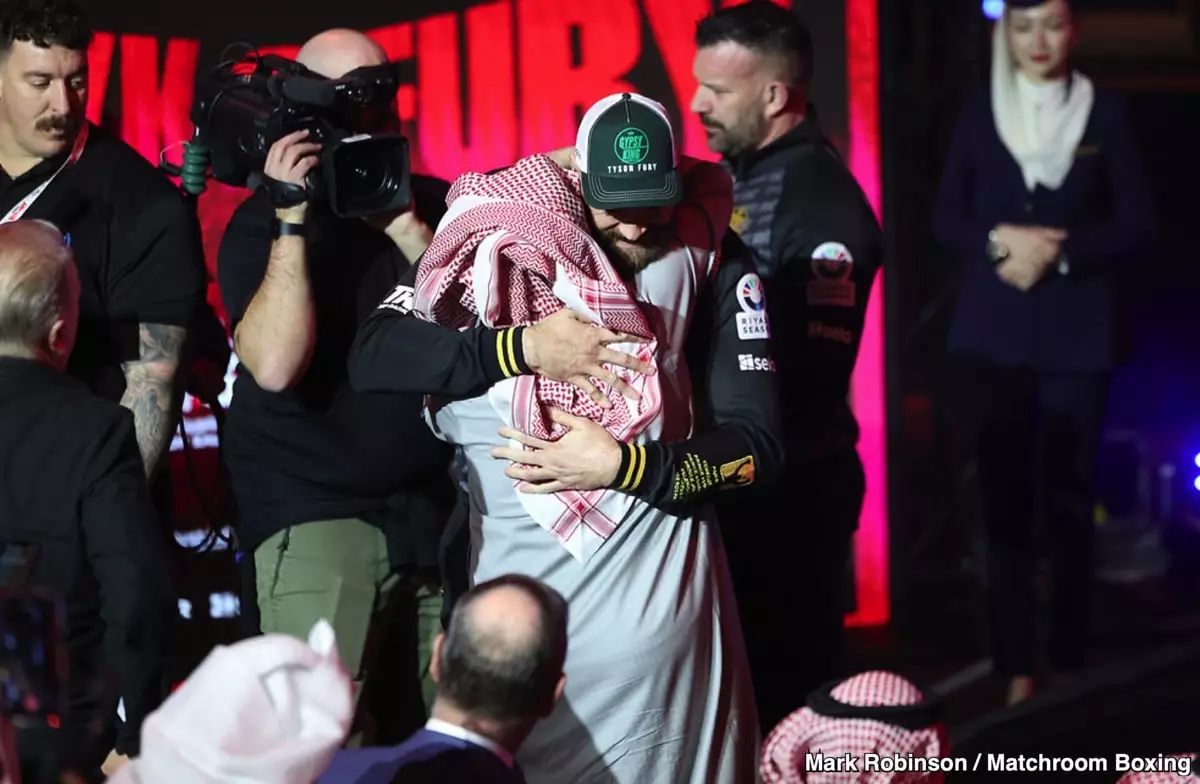Tyson Fury, a name synonymous with heavyweight boxing, is set to face Oleksandr Usyk in a much-anticipated rematch that has left fans and pundits alike on the edge of their seats. However, beneath the glittering lights and the roar of the crowd is a developing narrative that doesn’t revolve around Fury’s physical dominance but rather, his psychological state. Chris Mannix, an esteemed boxing commentator, raises concerns about Fury’s mindset as he prepares for this pivotal bout in Riyadh, Saudi Arabia. At 36 years old, Fury’s journey in the ring has been anything but ordinary, where victories and defeats have shaped his narrative profoundly.
Mannix draws attention to Fury’s troubling comments regarding his lack of communication with family over the past three months, posing questions about the champion’s mental readiness. This remark goes beyond typical pre-fight banter; it hints at deeper emotional struggles that could hinder his performance. The mental aspect of boxing cannot be overstated, and Fury’s disconnect with loved ones raises alarms about his focus and determination going into a fight that demands peak mental resilience.
Moreover, Mannix’s observations extend to Fury’s physical form, stating that he appears unhealthy compared to his past shape ahead of significant bouts. This comment seems especially relevant, as a fighter’s physicality often mirrors their mental stability. The notion that Fury is trying to conserve energy during a media workout further amplifies concerns about his conditioning. In the world of sports, such signals can be foreboding, as the absence of vigor might indicate an athlete grappling with underlying issues.
While Fury’s remarkable career has showcased his ability to bounce back from adversity, observers must note that he has never entered the ring following a loss against an opponent like Usyk. The psychological toll of defeat can often linger, leading to doubt and hesitance—a departure from the fierce confidence usually exhibited by champions. As Mannix comments, this leads one to ponder the extent of Fury’s reserves: “How much does he have left at 36 years old?” This question could prove pivotal, as a fighter’s age often reflects more than just the number of years spent in the ring—it signifies accumulated wear and tear on both the body and mind.
At this critical junction, it’s essential to turn the lens toward Usyk, a fighter whom Mannix regards as a “generational great.” Usyk’s technical proficiency and strategic mind make him a formidable opponent for anyone in the heavyweight realm. His ability to adapt and execute a game plan has led to unprecedented success, putting him in a class of his own. Fury, with his larger frame, may feel the need to impose a physical presence, yet Mannix’s argument that attempting to box Usyk may spell disaster cannot be dismissed lightly.
The implications of Fury’s state of mind create a precarious situation; if he can’t match Usyk’s discipline and adaptability, the rematch may unfold in unfavorable ways. Mannix emphasizes that success against Usyk requires an “all-in pressure style,” suggesting that Fury must not only revert to his roots but also rejuvenate his fighting spirit. Otherwise, failure to bring his finest performance could result in another crushing defeat for the once-unbeatable champion.
As Fury gears up to reclaim his status in the sport, it’s clear that both his physical and mental landscapes must harmonize. His current state, marked by inactivity and emotional strain, casts a shadow over his preparation. Mannix’s insights serve as a reminder that in boxing, the mind is as powerful as the fist. Success against Usyk demands a complete package—a fighter who not only enters the ring prepared physically but is equally as tuned in mentally.
Ultimately, the rematch will not simply be a battle of physical prowess but will also serve as a reflection of the mental landscapes of both fighters. It remains to be seen if Fury can rise to the occasion and confront his inner challenges or if Usyk will capitalize on these vulnerabilities, further solidifying his reign in the heavyweight division. In the sport of boxing, as in life, grappling with oneself can often be the greatest fight of all.

